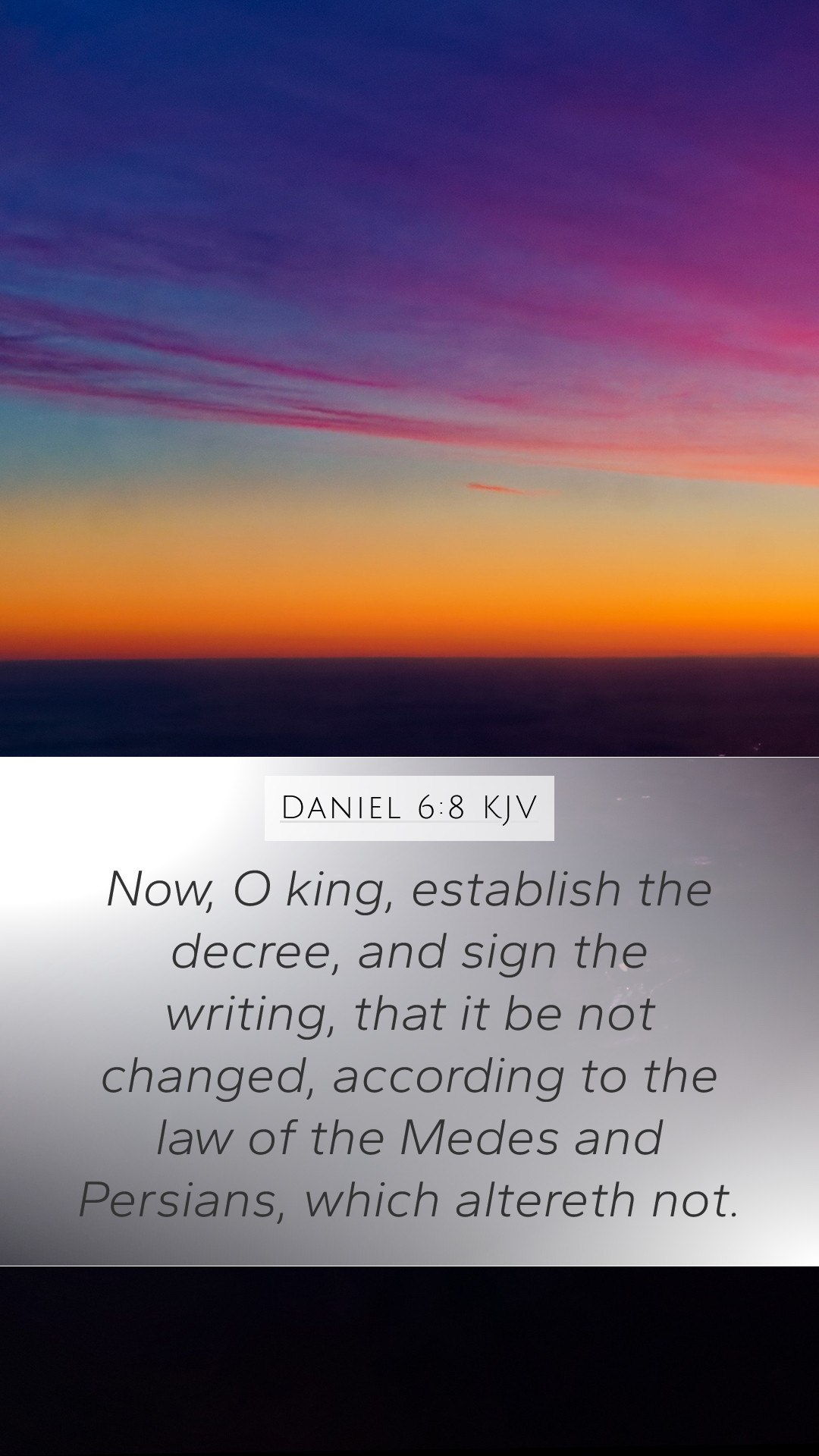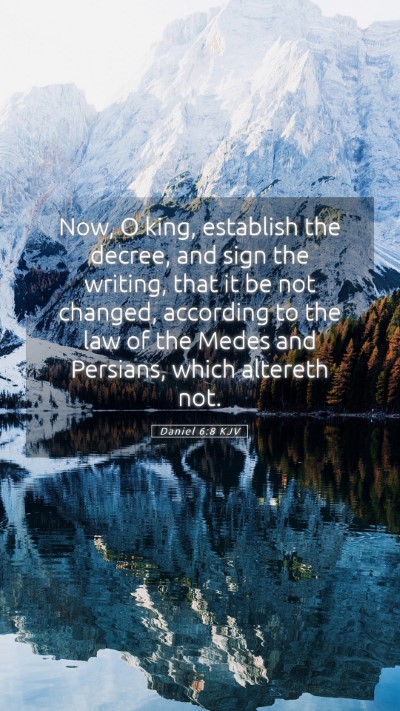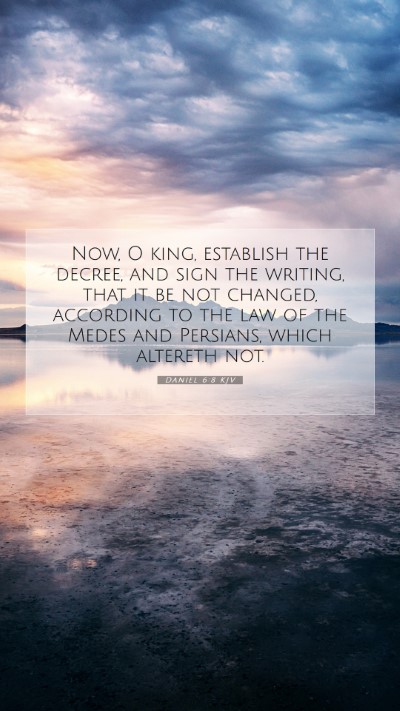Understanding Daniel 6:8
Daniel 6:8 states:
"Now, O king, establish the decree and sign the writing, that it be not changed, according to the law of the Medes and Persians, which altereth not."
Overview of the Verse
This verse occurs in the context of a plot against Daniel, where his adversaries conspire to trap him through the king’s decree. The significance of the verse can be explored through various commentaries, providing insights into its implications for understanding biblical law, authority, and the integrity of faith in the face of opposition.
Bible Verse Meanings
The key focus of Daniel 6:8 is the establishment of a decree that cannot be rescinded, which serves to illustrate the unyielding nature of certain laws within the Medo-Persian empire. The commentaries provide important interpretations of this verse:
-
Matthew Henry:
Henry highlights the deceptive tactics of Daniel’s enemies, emphasizing how they used the king’s power to manipulate and create a statuary obstacle for Daniel, a faithful servant of God. The commentary stresses how this reflects on the nature of human intrigue and the societal challenges that believers face.
-
Albert Barnes:
Barnes explains that the law of the Persians was known for being unchangeable. This non-flexibility serves as a metaphor for human laws that may stand in stark contrast to divine laws. He points out that despite this, God’s sovereignty often intervenes in human affairs, suggesting a higher authority beyond earthly decrees.
-
Adam Clarke:
Clarke provides a historical context for understanding the significance of decrees in ancient governments. He notes how these laws were designed to ensure stability, reflecting a broader commentary on the relationship between political power and personal faith. Clarke urges readers to consider the implications of unwavering laws that conflict with divine mandates.
Bible Verse Interpretations
In further interpretation, Daniel 6:8 serves as a prescient forewarning of the challenges that believers may encounter when their faith clashes with societal expectations. The decree signifies not merely a political document but also stands as an archetype for the trials faced by individuals who adhere to their convictions amidst adversity.
Historical Context
The historical backdrop provides vital insights in understanding this verse. The laws of the Medes and Persians, characterized by their immutability, offered a unique climate where personal and political tensions could arise. The public nature of the decree reflects the potent intersection of faith and governance—even more so when examined in the lens of Scriptural fidelity.
Biblical Exegesis
Exegetical studies of Daniel 6:8 reveal layers of meaning that pertain not only to the text but also to broader theological themes:
-
The Nature of Authority:
The challenge posed by unyielding authorities serves to highlight the tensions between civil law and divine command, prompting reflection on how believers can navigate this landscape.
-
Faith under Oppression:
This verse encourages an exploration of steadfast faith in the face of political pressures, demonstrating a call for believers to remain unwavering in their commitment to God’s principles.
-
The Role of Prayer and Petition:
In the wider passage, Daniel’s reaction to the decree—his continued prayer—is crucial for understanding how he maintained his integrity and faithfulness amidst trials. This aspect addresses practical applications of faith in daily life.
Bible Study Insights
For those engaging in bible study groups or seeking bible study resources, the themes arising from Daniel 6:8 offer numerous discussion points. Whether in an online bible study or Study Plan, members can reflect on:
- The implications of unchangeable laws in modern contexts.
- How faith can serve as a guide through political and social adversity.
- Personal experiences of facing challenges while adhering to personal beliefs.
Application of the Verse
The practical applications of this verse are manifold. Believers can draw parallels between Daniel's situation and contemporary dilemmas, encouraging a proactive approach in the face of cultural and legal challenges:
- How to stand firm in faith against societal pressures.
- Developing a robust understanding of one's beliefs in relation to prevailing laws.
- Strategies for prayer and spiritual growth amidst trials.
Cross References
This verse relates closely to:
- Esther 8:8 - The unchangeable laws of the Persians regarding decrees.
- Matthew 5:10-12 - Encouragement for those persecuted for righteousness' sake.
- Acts 5:29 - Obeying God rather than human authorities.
Conclusion
In summary, Daniel 6:8 serves as a powerful reminder of the responsibilities of faith in relation to civic duty and law. The interpretations provided by various biblical commentators enrich our understanding, allowing for a deeper exploration of the meaning of this scripture and its applications in contemporary life. By examining the historical context, engaging in biblical exegesis, and participating in thoughtful Bible study, believers can find valuable insights that guide their spiritual journeys in both personal and communal settings.


